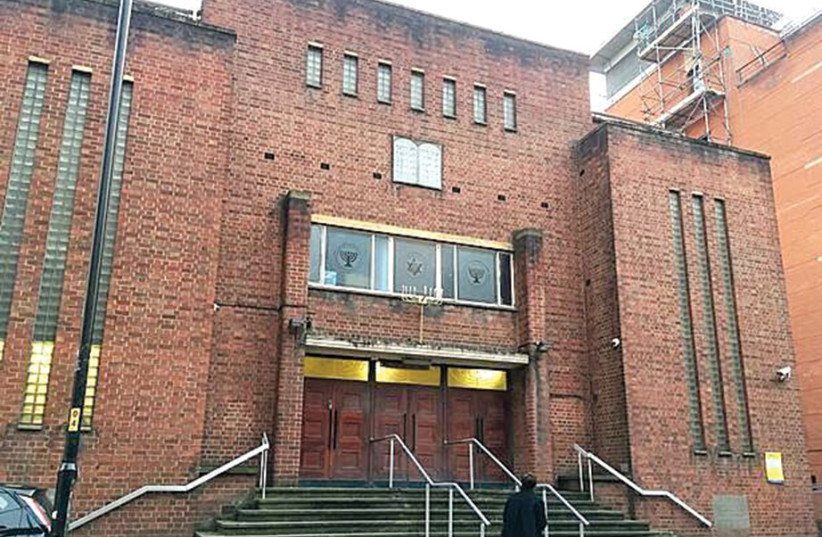Manchester is one of Britain’s largest cities after London, and its Jewish community is second in size only to that of the capital. On Sunday November 28, 2022, Manchester’s only city center synagogue closed its doors. A deconsecration service was attended by a distinguished gathering, which included Lord Mayor of Manchester Donna Ludford. In her address, Ludford said she was proud to follow in the footsteps of her Jewish predecessor, Abraham Moss, lord mayor of Manchester (1953-54), who had attended the synagogue’s opening service in 1953. “For decades,” she said, “the Jewish community has been a massive part of Manchester.”
“For decades, the Jewish community has been a massive part of Manchester.”
Donna Ludford
The ceremony ended with the Torah scrolls being removed from the ark. Participants formed a file, and the scrolls were carried in solemn procession out and around the building. Before the main doors were locked, no one could find the switch that operated the ner tamid (the eternal flame). So it was left burning as it had been for the previous 70 years.
The story of how the Jewish community began in Manchester, and its subsequent development, has been recounted in detail by Bill Williams in his book The Making of Manchester Jewry, 1740-1875.
The story of Manchester's Jewish community
It began with a few Jewish traders starting businesses in what was then a small provincial town. By the 1870s, Manchester, at the heart of the Industrial Revolution, had expanded hugely and was the only provincial center boasting three synagogues, each serving the Ashkenazi, Sephardi and Reform community.
The old established Jewish families in Manchester, just as their counterparts in London, had begun to respond to the allure of the Reform movement as it spread from Germany into Britain. In addition to its powerful appeal as a form of Jewish law and custom appropriate to the modern world, part of the movement’s attraction lay in its emphasis on Judaism as a religion rather than on the Jewish people as a clan. Many of those who pioneered and supported the Reform movement in the UK had family roots in the country, were deeply patriotic, and chose to describe themselves as “British Jews.”

This was why Britain’s first Reform synagogue called itself the West London Synagogue of British Jews. The new congregation, supported by four of the leading Jewish families of the day, was founded in 1840, and their synagogue, in the heart of London’s West End, was consecrated in January 1842. In 1857, those members of Manchester’s Jewish community committed to the Reform movement broke away from the Orthodox synagogue on Halliwell Street which they had been attending. Taking their lead from London, they founded the Manchester Congregation of British Jews. Their original synagogue, located in a busy Jewish neighborhood, was consecrated in March 1858.
The Blitz – Hitler’s sustained campaign of aerial bombing of British towns and cities – began in September 1940. On June 1 of 1941, Manchester’s Reform synagogue received a direct hit. The building was destroyed, together with most of its records and treasured possessions. The only items to be retrieved were the rimonim (decorative silver pomegranates) which sat atop one of the Torah scrolls. Rabbi Percy Goldberg ensured that religious services continued by holding them in a series of temporary venues until 1949, when compensation from the War Damage Commission, with additional assistance from donors and a building appeal, enabled the congregation to purchase a site and build a synagogue in Jackson’s Row. It held its first service in November 1953.
This is the building that is due to be demolished to make way for a 41-story high-rise and five-star hotel project in a development headed by former Manchester United football star Gary Neville. His real estate firm, significantly named Relentless, has pursued its dream of this major £200 million city center development through thick and thin. His long-awaited project was approved in 2018 after the original plans sparked a huge backlash.
There was a period when the congregation members were in favor of having the synagogue remain on the site and be incorporated into the development. Later, they decided to sell the building and relocate. A former synagogue president, Danny Savage, told the media that the £15m negotiated for the sale was double the building’s valuation. President of Manchester Reform, Jane Black, has said that the move from Jackson’s Row “ensures that Manchester’s Reform community will have a guaranteed long-term future.”
The community must now decide what comes next. A three-month community engagement project has begun, and every possibility will be examined, including merging with another Reform synagogue in Whitefield, a town in the Greater Manchester conurbation. Principal Rabbi Robyn Ashworth-Steen has said it is no secret that she would love to stay in the city center.
It’s for the community to say, she states, “but I think that having a Jewish community in the heart of the city is vital. With our great leaders and a proud history, the next couple of years – as we leave Jackson’s Row and find a new home – is a time full of potential.” ■
